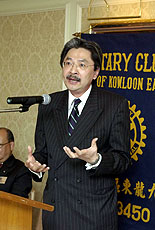
|
| Optimistic outlook: Secretary for Commerce, Industry & Technology John Tsang says Hong Kong will remain competitive in textiles and clothes manufacturing. |
Hong Kong will remain competitive in textiles and clothes manufacturing, and the trade's outlook will remain optimistic after the removal of import quotas by World Trade Organisation on January 1.
This was the message from the Secretary for Commerce, Industry & Technology John Tsang today who said he felt local factories will not move their facilities to the Mainland after the removal.
According to the WTO Agreement on Textiles & Clothing, quota restrictions imposed by all WTO members on their textiles and clothing imports will be completely lifted on New Year's Day.
Certain domestic exports of textiles and clothing to the US, the EU and Canada will no longer be subject to quota restrictions.
Liberalisation intensifies market competition
Mr Tsang said the removal of the quota system marks an important milestone in the liberalisation of international trade in textiles and clothing.
He said while trade liberalisation can broaden the scope for trade and facilitate market expansion by Hong Kong business people, this will at the same time intensify market competition.
Mr Tsang pledged the Government will continue to offer the trade a business-friendly environment and improve services. For example, all existing quota-related regulatory measures will be lifted. A simple and reliable system will be kept to protect the rights and benefits of locally made products.
He urged the trade to lower production costs and boost product quality to sharpen Hong Kong's competitiveness.
New regulatory framework set for LegCo tabling
Mr Tsang said the proposed regulatory framework for textiles after the quota removal has been worked out and law revisions will be tabled at the Legislative Council in October.
"We will still continue to allow our manufacturers here to make use of the outward processing arrangement that helps them to deal with a lot of the more labour-intensive aspects of the manufacturing," he said.
On Hong Kong's competitiveness after the quota removal, Mr Tsang stressed a number of factors affect business and investment decisions, not just costs.
While production costs here are higher than neighbouring cities, Hong Kong still has its advantages, like product quality and prompt response to market demand.
Hong Kong has become a key financial, logistics, information and services support and co-ordination hub in the region.
"I think Hong Kong will continue to remain a pretty attractive place for the manufacturing of textiles and clothing," Mr Tsang said.
|